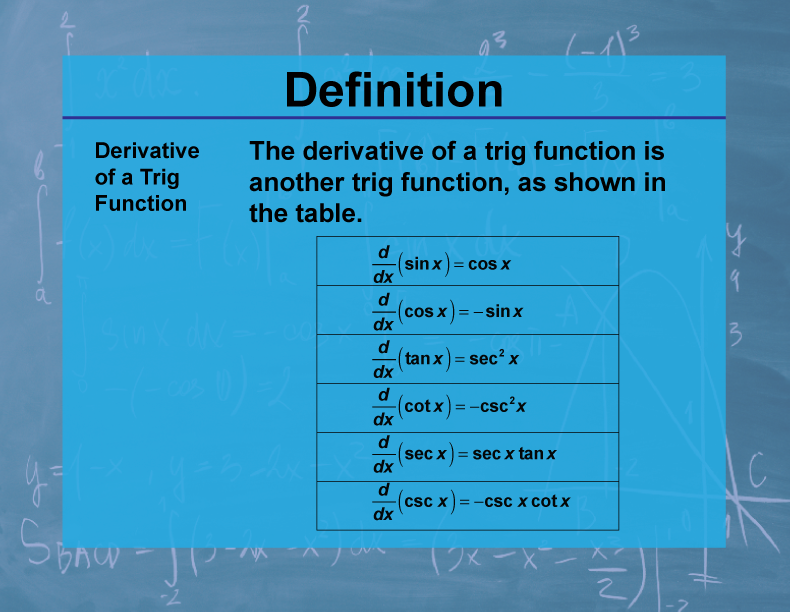
Display Title
Definition--Calculus Topics--Derivative of a Trig Function
Display Title
Definition--Calculus Topics--Derivative of a Trig Function

Topic
Calculus
Definition
The derivatives of the basic trigonometric functions are:
- d/dx(sin x) = cos x
- d/dx(cos x) = -sin x
- d/dx(tan x) = sec2 x
- d/dx(cot x) = -csc2 x
- d/dx(sec x) = sec x tan x
- d/dx(csc x) = -csc x cot x
Description
The derivatives of trigonometric functions are fundamental in calculus and have wide-ranging applications in physics, engineering, and other sciences. They are particularly useful in analyzing periodic phenomena, such as wave motion, alternating currents, and planetary orbits. Understanding these derivatives is crucial for solving differential equations involving trigonometric functions.
In mathematics education, learning the derivatives of trigonometric functions helps students connect calculus to geometry and periodic behavior. It reinforces the concept of rates of change in cyclical processes and provides a foundation for understanding more complex trigonometric identities and their applications. This knowledge is essential for students pursuing advanced studies in mathematics, physics, or engineering.
Teacher's Script: "Imagine you're analyzing the motion of a pendulum. The angle θ of the pendulum from its equilibrium position can be modeled by the function θ(t) = A sin(ωt), where A is the amplitude and ω is the angular frequency. To find the angular velocity, we need dθ/dt. Using the derivative of sine, we get dθ/dt = Aω cos(ωt). How does this relate to the pendulum's motion? When is the angular velocity maximum or minimum? How can we use this to understand the pendulum's energy at different points in its swing?"

For a complete collection of terms related to Calculus click on this link: Calculus Vocabulary Collection.
| Common Core Standards | CCSS.MATH.CONTENT.HSF.IF.C.7, CCSS.MATH.CONTENT.HSF.BF.A.1.C |
|---|---|
| Grade Range | 11 - 12 |
| Curriculum Nodes |
Algebra • Advanced Topics in Algebra • Calculus Vocabulary |
| Copyright Year | 2023 |
| Keywords | calculus concepts, limits, derivatives, integrals, composite functions |